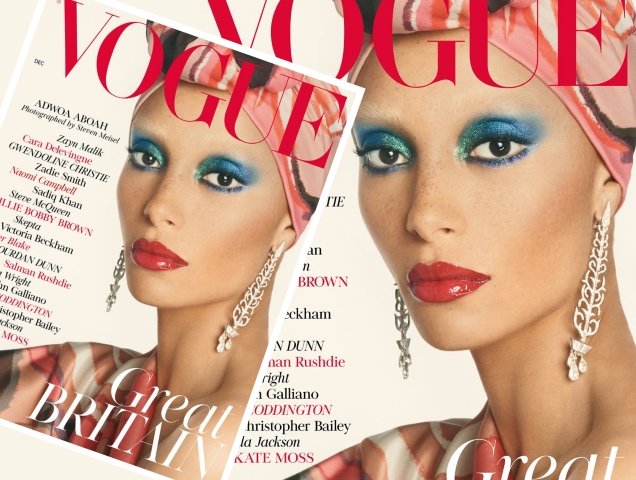
image: TFS
What is in a name? Everything, according to Vogue. The international fashion publication’s parent company has been working to ensure that its prized title is the only Vogue out there, and this includes a trademark battle against a “small” British nightclub in a town north of Manchester.
Owners of the Vogue nightclub in Burnley, a town of 73,000 in Lancashire, England, say they have been threatened with a trademark infringement lawsuit by the magazine’s owner over their name. According to Rebecca and Jason McQuoid, who opened the club in 2012, in addition to being slapped with a cease and desist letter from the lawyers of British Vogue’s owner Advance Publications, the magazine has threatened to take them to court and to shut down the club’s social media sites in the meantime, claiming that consumers are being confused by the like-named club.
The McQuoids initially attempted to fight back against the media giant, arguing that the likelihood that consumers will believe the nightclub is in some way affiliated with or formally sponsored by the magazine, the central inquiry in a trademark action, is extremely low. “No one’s going to think Kate Moss is in Vogue in Burnley,” co-owner Jason McQuoid said. “Everyone knows it [has] nothing to do with the magazine.”
The McQuoids say that they ultimately agreed earlier this week to rebrand – from Vogue to Mode – in order to avoid litigation, but have since received a second letter from the media giant’s counsel. In the follow-up letter, dated November 29, Advance’s counsel accuses the McQuoids of speaking to the press in a way that suggests they are “not in fact committed to rebranding away from Vogue to Mode.”
Advance’s counsel has also accused the club owners of continuing “to promote [the club] as Vogue Burnley on Twitter, Facebook, and Snapchat.” According to the letter, “As you are aware, our client has the right to have these sites taken down with immediate effect as they constitute infringements of Advance’s trademark VOGUE for nightclub and related services and a breach of your previous undertaking to rebrand.”
The letter goes on to state that if the McQuoids are still using the Vogue name in connection with their social media accounts on January 9, Advance will move to have them permanently disabled; as of now, the McQuoids say that Advance has had their Facebook page removed from the platform. “They have removed our Facebook page. We have had to start all over again.”
Mrs. McQuoid has voiced concern about the cost of the rebrand, saying: “It’s been awful, we were completely shocked by what this letter said. We had a meeting recently and the change is going to be expensive, we’ve got to change the massive signs outside, the company vehicle, around 40 employee uniforms, branded tables inside, everything.”
Mr. McQuoid echoes his wife, and says that Vogue’s targeting of the 5-year old club is “just very mean.” He also accused the magazine of bullying, telling the BBC, “We’re a small town, we’re just two people running a small nightclub, we’re not a chain. It’s bullying. I can’t think of any other word – it’s a big business bullying a small one.”
In a statement, Condé Nast, the publisher of Vogue, said: “As policy, Advance and Condé Nast Britain do not comment on pending disputes.”
That’s OUR Name
Vogue nightclub is hardly the first company to come under fire with a much larger entity over its name. Last year, Spanish fast fashion giant, Zara, threatened to sue the owner of a small, United Kingdom-based business, called Zara’s Countywear. Zara threatened legal action should the owner, who named the business her newborn daughter, Zara, not rebrand her business immediately. The fast fashion retailer – whose parent company Inditex holds the title of the world’s largest apparel manufacturer – also took on New York-based brand, Terez, formerly known as Zara Terez, over its name, forcing the small brand to rebrand as part of a settlement agreement.
Before that, Christian Dior threatened to file suit against Australian photographer, Sirous Dior if he kept using his name in connection with his business.
And then there is Chanel. Ever the vigilant defender of its name, Chanel also initiated internal intellectual property proceedings with Instagram earlier this year against Chanel Bonin, a 20-year old woman from Vancouver, Canada, who has the “@Chanel” Instagram account. In this instance, Chanel did not have much luck. While it was able to get Instagram to remove images from Bonin’s account that included its logos, it was unable to claim the account for itself.
More recently, Chanel filed and won a trademark action against Merrillville, Indiana salon owner, Chanel Jones. In its suit, Chanel alleged that Chanel’s Salon, a spa and beauty salon, infringes at least nine of its federally registered trademarks and is benefiting from the established reputation of the fashion company’s name, which is derived from the founding designer’s name, Gabrielle Bonheur Chanel. And even since, Chanel has since filed a trademark suit against a Michigan-based brand, Shanel Fashion. That case is still pending.
Unfortunately for the people who share a name with a famous brand and those that favor the little guys, these instances are a reminder of the well-settled legal fact that an individual does not have an unfettered right to use his/her personal name for commercial purposes.
Chanel aptly stated in its lawsuit against Chanel Jones and Chanel’s Salon, there is “no absolute right to exploit one’s given name commercially if such use is inconsistent with Chanel’s rights,” and well-known entities, whether it be Vogue or Dior, often initiate such battles in order to avoid consumer confusion and/or use that may impair the strength of their famous marks by diluting them. It is the trademark holder’s duty to police unauthorized uses of its trademarks, after all.
As for whether the bullying-related bad press that comes tends to come hand-in-hand with such David vs. Goliath battles is worth it, that is another matter entirely.







